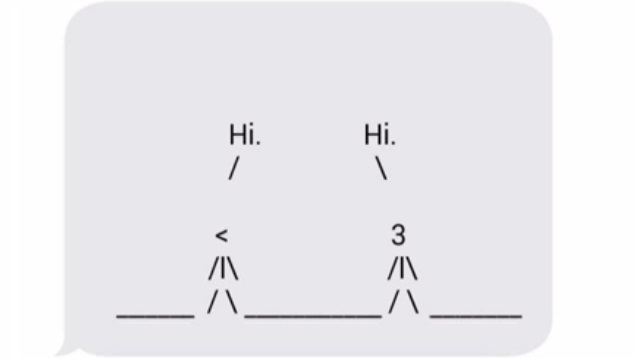SUMMARY
This is AI generated summarization, which may have errors. For context, always refer to the full article.

MANILA, Philippines – The Metro Manila Film Festival (MMFF) celebrates its 39th year by opening up the doors to younger, independent filmmakers. While larger, big budget studios have dominated MMFF headlines, festival organizers have made it a point to embrace independent filmmaking through its New Wave category.
This year, the MMFF is conducting its very first Cinephone Competition where high school and college students can submit films produced and shot through their mobile phone cameras. As part of its campaign, it has released a series of text-only films that are viewable completely through a wide variety of mobile phones.
These 4 text films are made entirely out of text characters and are available for free through the Metro Manila Film Festival website. They are a testament to the kind of tools available for innovative storytellers, and proof that a phone is all you need to make a film. The 4 text films are “Make Love,” “I Want Your Body,” “I Want Your Body 2,” and “Hangman.”
While it’s admittedly odd for a Filipino film festival to use english-written stories to promote its movies, these text-only films provide a brand new way of creating and sharing stories in time for the biggest film festival in the country.
Here are the MMFF Cinephone films:
“Make Love”
When a romantic named Less-Than searches for his one true love, he discovers that a soulmate requires more than just a few cheesy pick-up lines. It’s a love story that fits well with the usual MMFF love story mold, but updated for the emoticon generation.
Like the rest of the MMFF text films, “Make Love” is characterized by quirky punchlines that are as endearing as they are cheesy. Despite the text film’s predictable end, its light-hearted execution and imaginative visuals makes for a charming pocket-sized narrative. “Make Love” is an ingeniously simple love story that is short, sweet and undeniably clever.
“I Want Your Body”
When a disembodied head goes on a psychotic killing spree in search of a body, the result is a massacre that is disturbingly funny and equally unsettling. But when our disembodied anti-hero finally finds what he’s looking for, he realizes that some bodies have a mind of their own.
What “I Want Your Body” lacks in subtlety, it earns in its impressive use of text. As a text-only film, “I Want Your Body” and its subsequent sequel provide the most remarkable use of visuals from the series. But where it succeeds in aesthetic, it unfortunately lacks in substance. The carnage ensues with little rhyme or reason, but is nonetheless impressive. What begins as a harmless search for identity culminates into a text-based massacre that is clever, shallow but undoubtedly fun.
“I Want Your Body 2”
As with any sequel, “I Want Your Body 2” is bigger, bolder and arguably bloodier. The text film picks up right after the events of the original “I Want Your Body.” A headless woman goes on a violent rampage as she hunts down the perfect head for her body. But her actions aren’t without consequence, and she quickly learns that an old nemesis is out for revenge.
Much like the original text film; “I Want Your Body 2” showcases a lot of creative visuals through the simple use of text. And very much like the original, “I Want Your Body 2” unfolds like a drug-inspired roadtrip. Viewers hoping for some rational explanation to the two-part series will be unsurprisingly disappointed. When it comes to looking for your own head, fewer things are supposed to make sense.
“Hangman: The Game to Die For”
“Hangman” may have the most conventional narrative of the 4 text films, but it still isn’t exempt from the film series’ morbid humor. Two seemingly innocent contestants find themselves on a game show called “Hangman” and discover that the price for playing may put them in over their head. As the game progresses, so do the stakes as our two anxious protagonists are forced to play for their lives.
Unlike the other text films in the series, “Hangman” feels more grounded that its peers. While the story itself is simple enough, the film’s overly casual depiction of violence can be likened to exploitation horror films such as “Saw” and “Hostel.” But its intentional camp and humor makes it an interesting fit for the medium. – Rappler.com

Zig Marasigan is a freelance screenwriter and director who believes that cinema is the cure for cancer. Follow him on Twitter at @zigmarasigan.
More from Zig Marasigan
- ‘Islands:’ In the ocean of isolation
- ‘Shift’ is not a love story
- ‘Bukas Na Lang Sapagka’t Gabi Na:’ The art of rebellion
- ‘Blue Bustamante:’ A hero with a heart
- Brillante Mendoza’s ‘Sapi:’ Half-hearted horror
- ‘Bekikang:’ The brand new face of comedy
- ‘Status, it’s complicated:’ A joke worth repeating
Add a comment
How does this make you feel?
There are no comments yet. Add your comment to start the conversation.